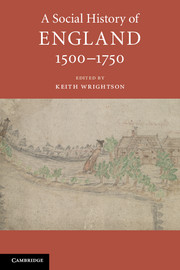Book contents
- Frontmatter
- Contents
- List of Figures
- List of Tables
- List of Contributors
- Acknowledgements
- List of Abbreviations
- Introduction: Framing Early Modern England
- PART I DISCOVERING THE ENGLISH
- 1 Crafting the Nation
- 2 Surveying the People
- 3 Little Commonwealths I: The Household and Family Relationships
- 4 Little Commonwealths II: Communities
- PART II CURRENTS OF CHANGE
- PART III SOCIAL IDENTITIES
- Coda: History, Time and Social Memory
- Further Reading
- Index
1 - Crafting the Nation
from PART I - DISCOVERING THE ENGLISH
Published online by Cambridge University Press: 28 May 2018
- Frontmatter
- Contents
- List of Figures
- List of Tables
- List of Contributors
- Acknowledgements
- List of Abbreviations
- Introduction: Framing Early Modern England
- PART I DISCOVERING THE ENGLISH
- 1 Crafting the Nation
- 2 Surveying the People
- 3 Little Commonwealths I: The Household and Family Relationships
- 4 Little Commonwealths II: Communities
- PART II CURRENTS OF CHANGE
- PART III SOCIAL IDENTITIES
- Coda: History, Time and Social Memory
- Further Reading
- Index
Summary
In September 1589, a troupe of professional players – the Queen's Men – arrived in Carlisle at the north-west extremity of Elizabeth I's kingdom. We do not know where they played, but it is probable that, like travelling players in subsequent decades, they performed in the Moot Hall. Nor do we know what they played, but the symbolic restaging of the defeat of the Spanish Armada in The Three Lords and Three Ladies of London, penned by one of its members, Robert Wilson, would have made that play a timely choice, coming as it did a mere twelve months after the invading Spanish fleet had been repelled. That being so, the inhabitants of Carlisle would have been greeted in their civic space by an actor, ‘very richly attired, representing London’, stepping forward to address the audience and to deliver thanks that:
All England is, and so preserv'd hath bene.
Not by mans strength, his pollicie and wit,
But by a power and providence unseen.
Despite the metropolitan focus of the title, these opening lines frame the play as one that concerns a moment of national significance, affecting ‘All England’, and they testify to a belief in the special favour that God shows the English nation. Those lines also collapse the distance between London and the regions in which this play was almost certainly performed. ‘London bids you welcome’, the preface ends (sig. A2v), verbally transporting its audience to the capital itself, where they are subsequently enrolled in the action, addressed directly by characters in the play, or at one point participate as judges in a singing competition arranged by the ‘everyman’ figure, Simplicity, who rejects the adjudication of his ‘copesmetes’ on stage and instead turns to ‘one of the auditory’ (sig. C1v).
This chapter studies the way in which ideas of ‘the nation’ – as found in Three Lords and Three Ladies – were formed and disseminated in early modern England. The nation is more than an administrative unit; as Benedict Anderson writes, it is a construction: a ‘cultural artefact’ capable of arousing ‘deep attachments’. Anderson's definition of the nation as ‘an imagined political community’ is useful (6).
- Type
- Chapter
- Information
- A Social History of England, 1500–1750 , pp. 19 - 38Publisher: Cambridge University PressPrint publication year: 2017
- 1
- Cited by

